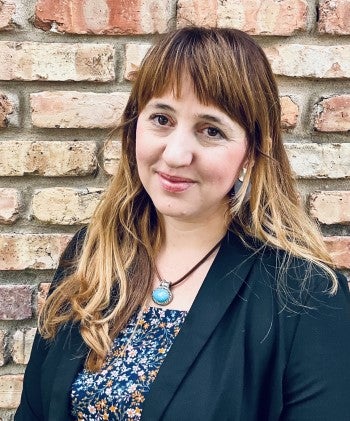Mathematics alum wins national dissertation award

When asked what she finds so appealing about mathematics, Boise State alum Heather Wilber laughs and replies, “I could talk a lot about this.” And she does. Mathematics and the way it embraces the complicated reality of infinity is something Wilber is passionate about. It definitely shows.
Wilber is one of the 2022 winners of the Association for Women in Mathematics Dissertation Prize for her dissertation titled “Computing numerically with rational functions,” published at Cornell, as well as the 2022 Householder Prize.
Wilber’s fascination with infinity began when she took an undergraduate class at the University of Idaho that piqued her interest in mathematics. When she transferred to Boise State to be closer to her family, she signed up for a calculus class with Professor Otis Kenny. It was a pivotal moment for Wilber.
“It was the most fun, amazing, beautiful class I’ve ever taken,” Wilber said.
“What I really appreciate about calculus is that when we try to understand the real world, a lot of what we do is we break it up into simple segments and chunks, right? If I want to understand the area under a curve, I can break that space into a bunch of little rectangles because rectangles are easy to work with. What calculus says is, ‘If you want to know the exact answer, the true answer, you have to consider what happens at infinity.’”
Wilber chose to pursue her master’s in applied mathematics at Boise State. Alongside Professor Grady Wright, Wilber dove into developing algorithms and software that allows non-experts to more easily perform advanced computations, such as those taught in calculus, in spherical and cylindrical geometries. This research caught the attention of NASA, and Wilber scooped up a NASA Idaho Space Grant Consortium fellowship in 2015.
Upon graduating with her master’s, her thesis won the Boise State 2017 Distinguished Thesis in STEM award, and she also earned a National Science Foundation Graduate Research Fellowship. With this paid fellowship, Wilber advanced her education at Cornell University, where she continued tackling the patterns, paradoxes and problems that make math enticing. She earned her doctorate in applied mathematics in May 2021 from Cornell University.
“Heather is the quintessential model of an applied mathematician: one with a strong foundation in theory, a propensity for analysis, a talent for computing, and an unquenchable curiosity,” Wright said. “I couldn’t be more proud of the many accomplishments she’s made since finishing her master’s thesis at Boise State. This latest award further solidifies Heather as one of the top scholars in her field and illustrates the bright future she has ahead.”
Wilber is now a National Science Foundation postdoctoral fellow at the Oden Institute, University of Texas at Austin, and winner of multiple prestigious awards. She conducts mathematical research with a group that is interested in studying and modeling the physics of waves and electric fields.
Her advice to current students? Be audacious. After Wilber earned her doctorate, the first thing she did was sign up for an improv theater class.
“I want to be learning new things all the time and I want to be uncomfortable,” Wilber said. “Discomfort is something you need in order to learn.”
— By Brianne Phillips